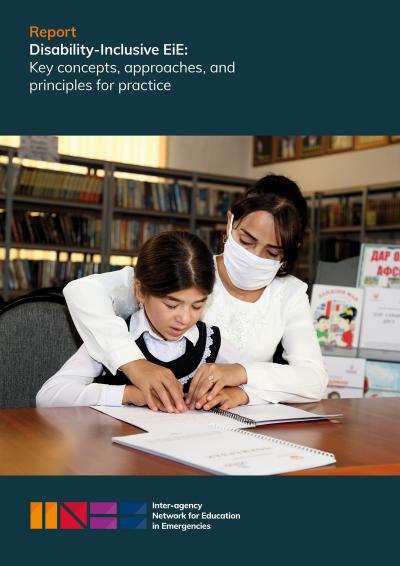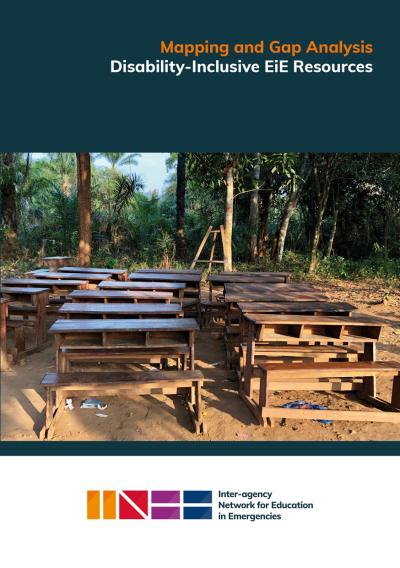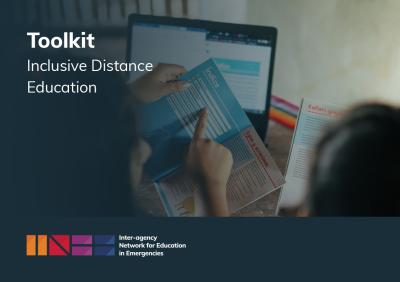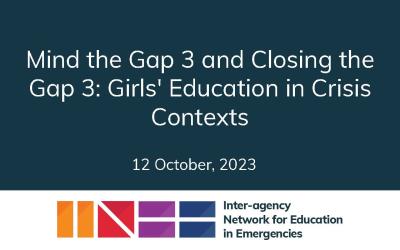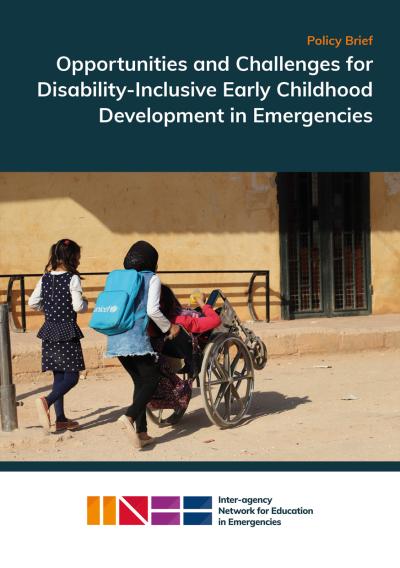التعليم الجامع
إن التعليم هو حق أساسي لجميع البشر، ويجب العمل دوماً على ضمان تحقيقه لجميع الأطفال والمراهقين بغض النظر عن الوضع الاجتماعي أو الجنس أو العمر أو الإعاقة أو اللغة أو الدين أو أي خصائص أخرى. وتشير التقديرات الحديثة إلى وجود حاجة للدعم التعليمي لحوالي 224 مليون شاب متأثر بالأزمات. وبناءً على تلك التقديرات، يعيش واحد من كل 10 شباب مع إعاقة، مما يعني أن حوالي 22.4 مليون شاب ذو إعاقة قد يواجهون تحديات خاصة في حالات الطوارئ و الأماكن المتأثرة بالأزمات.
يهدف التعليم الجامع (التعليم الشامل للجميع) إلى تمكين الحضور والمشاركة وتحقيق الإنجاز التعليمي لجميع الأفراد بشكل عادل. يهدف التعليم الجامع إلى ضمان احترام تنوع الأفراد في الفصل الدراسي، ويعمل على منع التمييز وتوفير الدعم الكافي لإزالة الحواجز التعليمية وتجنب استخدام اللغات أو المحتوى أو الأساليب التعليمية التي لا تتناسب مع احتياجات جميع المتعلمين. عادة، يكون الأشخاص ذوو الإعاقات الجسدية والحسية والنفسية الاجتماعية/العقلية والتنموية من بين الأشخاص الأكثر استبعادًا من فرص التعليم. يعترف التعليم الجامع بأن كل شخص يمتلك خصائص واهتمامات وقدرات واحتياجات تعليمية فريدة، ولذلك يجب إزالة العوائق التي قد تحول من المشاركة والتعلم وتكييف المناهج والمواد التعليمية لتلبية احتياجات جميع المتعلمين بكل تنوعهم ومساعدتهم في تحقيق إمكانياتهم بالكامل. في حالات الطوارئ، يمكن الإشارة أيضًا إلى هذا النهج باسم "التعليم الشامل في حالات الطوارئ".
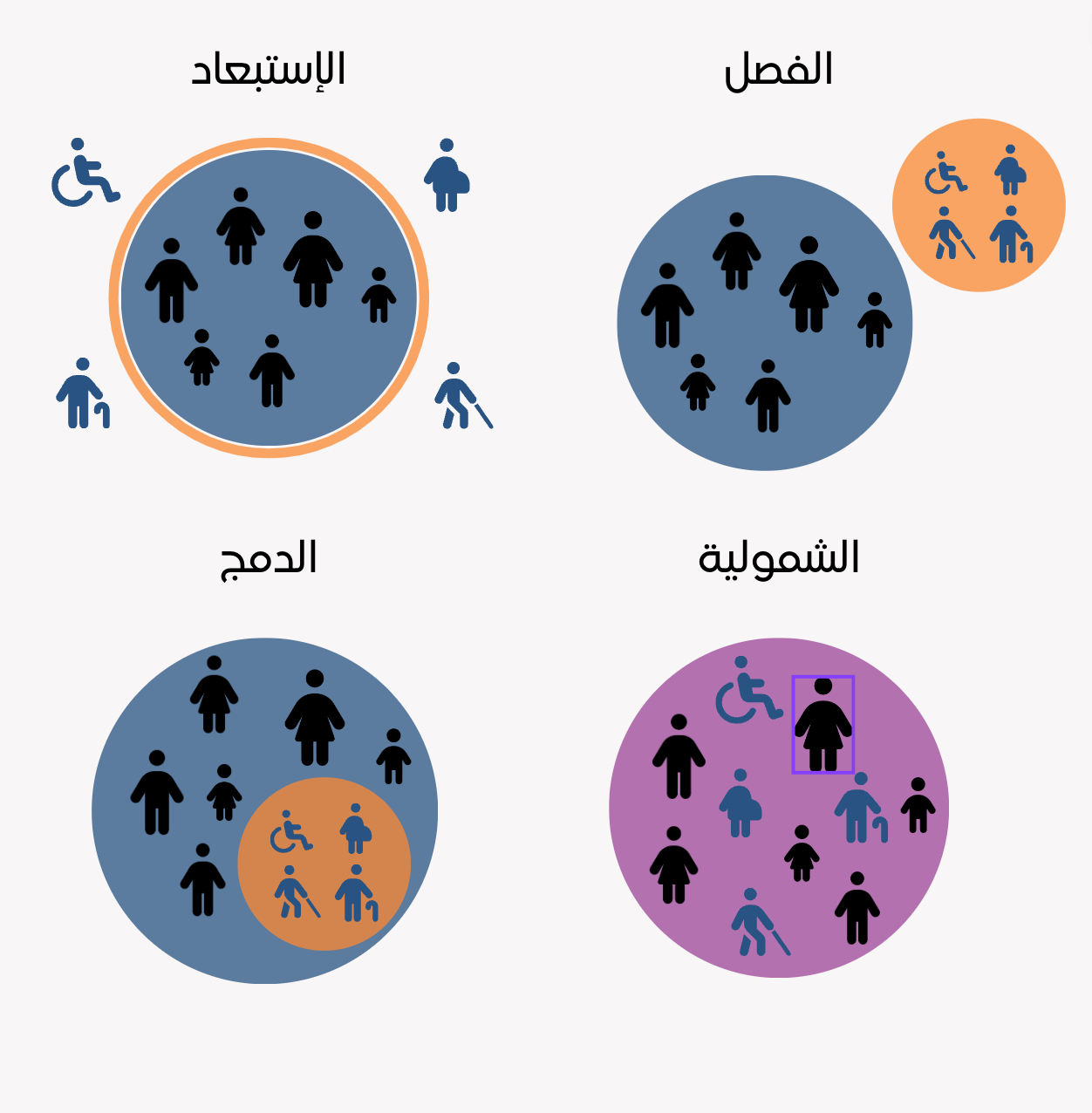 بشكل تقليدي، تختلف التربية الخاصة، أو الذي يُشار إليه في بعض السياقات بتعليم ذوي الاحتياجات الخاصة، عن نظام التعليم الجامع من حيث يعتمد على الفصل أو الإدماج بدلاً من الشمولية. عندما يتم تنفيذ برامج التعليم الخاص في فصول دراسية منفصلة أو مدارس منفصلة، ينشئ ذلك نهجًا تعليميًا مستقلاً بدلاً من نهج شامل حقًا. يمكن لتطبيق مبادئ التصميم العالمي في التعليم أن يضمن توفير فرص متساوية لجميع الطلاب للوصول إلى عمليات التعليم والمشاركة فيها بكفاءة والاستفادة القصوى منها.
بشكل تقليدي، تختلف التربية الخاصة، أو الذي يُشار إليه في بعض السياقات بتعليم ذوي الاحتياجات الخاصة، عن نظام التعليم الجامع من حيث يعتمد على الفصل أو الإدماج بدلاً من الشمولية. عندما يتم تنفيذ برامج التعليم الخاص في فصول دراسية منفصلة أو مدارس منفصلة، ينشئ ذلك نهجًا تعليميًا مستقلاً بدلاً من نهج شامل حقًا. يمكن لتطبيق مبادئ التصميم العالمي في التعليم أن يضمن توفير فرص متساوية لجميع الطلاب للوصول إلى عمليات التعليم والمشاركة فيها بكفاءة والاستفادة القصوى منها.
الرسائل الرئيسية
- إن التعليم حق للجميع وفقًا لمبادئ إطار داكار، يعتبر التزامًا عالميًا بتوفير التعليم الجيد للجميع، بما في ذلك الأطفال، والشباب، والبالغين. يتضمن ذلك الأفراد الذين يعيشون من إعاقات سواء كانت مكتسبة قبل وقوع الكوارث أو ناجمة عن كوارث طبيعية أو أحداث صنع الإنسان. لذا، يجب تبني نهج يرتكز على حقوق الإنسان في مجال التعليم في حالات الطوارئ الشاملة للإعاقة، وتعزيز تضمين قضية الإعاقة في البنية التنظيمية والمؤسسية.
- يعتبر التعليم في حالات الطوارئ فرصة لبناء أنظمة تعليمية شاملة للجميع منذ البداية، خاصة في الحالات التي تكونت فيها الأنظمة التعليمية تحت ضغط كبير أو حتى انهارت بالكامل.
- إن التعليم الجامع هو "نظام عمل الديمقراطية بشكل إجرائي"، حيث يمنح الفرصة لإعادة بناء المجتمعات المتضررة وتوحيد الناس من أجل تجاوز الانقسامات المختلفة، مواجهين تحديًا مشتركًا في توفير فرصة عادلة للتعليم الآمن والمناسب لجميع المتعلمين، ويعزز ثقافة التقبل والتنوع.
- إن التعليم في حالات الطوارئ والأزمات يتطلب تركيزًا إضافيًا على ضمان وصول الأفراد ذوي الإعاقة إلى التعليم، نظرًا لأن الكوارث الطبيعية والأحداث التي تسببها البشر تترك آثارًا جسدية ونفسية على الناس. كما يمكن أن يكون الأفراد ذوو الإعاقة عرضة لمخاطر وعقبات إضافية فيما يتعلق بالوصول إلى المساعدات الأساسية (مثل الغذاء والمياه والإسكان)، سواء بسبب صعوبة الوصول إلى المواقع الجسدية للتوزيع أو البنى التحتية للصرف الصحي والمدارس، أو بسبب وجود عوائق للحصول على المعلومات حول التوزيع والخدمات المتاحة.
- تقديم التدخلات المبكرة والمواد التعليمية الشاملة والمتاحة بسهولة، بالإضافة إلى توفير مناهج تعليمية وتقييم عادل، يساهم في ضمان وصول ومشاركة جميع المتعلمين، بما في ذلك ذوي الإعاقة.
- إشراك المجتمعات بشكل فعال في جهود التعليم، بما في ذلك منظمات ذوي الإعاقة، يعزز من ملكية الجهات المحلية للمبادرات التعليمية الشاملة.
- يجب تعزيز جهود جمع البيانات المتعلقة بالإعاقة لاتخاذ قرارات مستنيرة في جميع مراحل حالات الطوارئ.
- تقديم التدريب والدعم لمعلمين متنوعين، بما في ذلك معلمين ذوي الإعاقة، يمكن أن يسهم في تلبية احتياجات المتعلمين المختلفة بفعالية.
تم تطوير هذه المجموعة بفضل دعم ميريام جعفر، منسقة مجموعة عمل التعليم الجامع في الشبكة المشتركة لوكالات التعليم في حالات الطوارئ.




